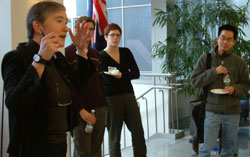Harvard Law's Janet Halley Speaks at 36th Annual Brainerd Currie Memorial Lecture
Harvard Law’s Janet Halley Speaks at 36th Annual Brainerd Currie Memorial Lecture
 Dr. Halley emphasizes a point to students and faculty in a reception following her lecture.
Dr. Halley emphasizes a point to students and faculty in a reception following her lecture.Janet Halley, a leading scholar in the relationship among gender, sexuality, race, ethnicity, class and the law, was the featured speaker Nov. 7 at Duke Law School’s 36th annual Brainerd Currie Memorial Lecture.
Dr. Halley, a Harvard Law School professor, gave a speech titled “A Map of Feminist and Queer Theories of Sexuality and Sexual Regulation,” in which she pointed out ongoing change and conflict among leading theorists in feminism. Halley, author of “Don't: A Reader's Guide to the Military's Anti-Gay Policy,” outlined various theories of feminism, noting her own evolving belief in them.
“Every one of these positions I’ve occupied at one time or another, and I see them all in conflict,” she said.
Dr. Halley also noted that feminist theory and queer theory often diverge. She went on to describe the characteristics she sees as essential for queer theories that best attempt to understand sexuality and the politics of sexuality. Such theories, she said, should be:
- Sex affirmative, meaning they endorse and accept human sexuality including its positives and negatives.
- Shame affirmative, in noting that people derive more pleasure from shame, and from the relinquishment of power in sex, than many are willing to admit.
- Open to irrationalism, meaning the authors are open to paradox and uncertainty as sources of insight.
- Unhindered by the need to neatly categorize people and define their sexual and political roles by category.
- Politically engaged toward the left.
In addition to her JD from Yale Law School, Dr. Halley earned a Ph.D. in English literature from the University of California at Los Angeles as well as a BA in English literature from Princeton University. Through education, training and legal practice, she has become a well-known voice in fields including politics, law and literature.
Before joining the faculty at Harvard Law, Dr. Halley was a professor at Stanford Law from 1995-2000 and an associate professor from 1991 to 1995. From 1989 to 1991 she was an associate in litigation with the Boston office of Skadden, Arps, Slate, Meagher & Flom. In addition to various clerkships and fellowships, she also was an assistant professor of English at Hamilton College in Clinton, NY from 1980-85.
Dr. Halley has said that her literary background enhances her insight into legal matters, such as the U.S. military’s policy toward gays. For example, she argues that a complete, patient review of the military’s current policy toward gay service members reveals that it regulates sexual status more than sexual conduct and is even worse for those affected than previous policies. She credits her education in literary criticism with helping her to reach that conclusion.
 Janet Halley chats with UNC doctoral student Glenn Grossman after her presentation.
Janet Halley chats with UNC doctoral student Glenn Grossman after her presentation.Throughout her career, Dr. Halley has earned numerous academic honors. To name a few, she was the Messenger Lecturer at Cornell University last year; the Chancellor’s Distinguished Fellow at the University of California at Irvine, also in 2001; and the Inaugural Lecturer at the New York University Center for the Study of Gender and Sexuality in 2000.
She also has been widely published. Among her recent works (in addition to Don’t) are:
Left Legalism/Left Critique, which she co-authored and edited with Wendy Brown of the University of California at Berkeley; “Recognition, Rights, Regulation, Normalization: Rhetoric of Justification in the Same-Sex Marriage Debate,” which appeared in Legal Recognition of Same-Sex Partnerships: A study of National, European and International Law; and “Sexual Orientation and the Armed Forces,” as well as “Romer v. Evans,” both of which were published in Encyclopedia of the American Constitution: Volume II. She is currently working on several projects, including a book to be titled Sexuality Harassment: A Critique of Sex Harassment Law.
In speaking at the Law School, Dr. Halley, joined a long and distinguished list of Brainerd Currie lecturers. Other recent participants have included Robert Post of the University of California at Berkeley; Robert Litan of the Brookings Institute; Martha Minow, also of Harvard Law School; and Robert Ellickson of Yale Law School.
The first Currie Lecturer, who spoke here in 1967, was Chief Justice Roger Traynor of the California Supreme Court. The series recognizes Professor Brainerd Currie, a noted scholar who was known for introducing the notion of governmental interest analysis to the field of conflict of laws.
To view this event, see Webcasts.